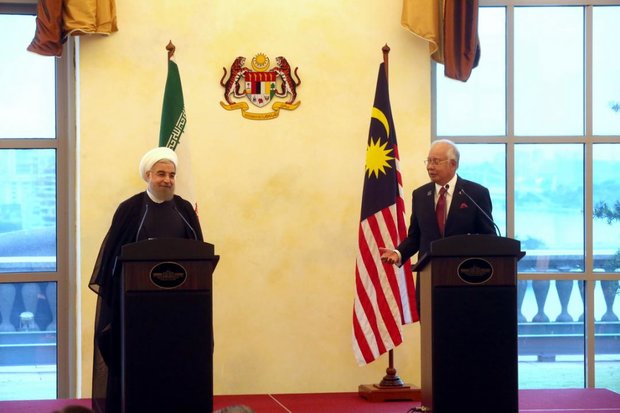Consolidation of relations between Iran and Asian states, especially regional economic powers, would mark a new chapter in Iran’s economic cooperation with the outside world.
As long as the world is moving towards multi-polarity in the political, economic and cultural arenas, the Southeast Asia countries, in particular, as a cradle of emerging economies are moving towards sustainable economic development.
In an indication of fostering Iranian ties with the regional countries, Asian in particular, President Hassan Rouhani launched his three-nation East Asian tour early October aimed at enhancing relations with the southeastern Asian states.
President Rouhani’s Southeast Asia Tour
President Rouhani’s visits to Vietnam, Malaysia and Thailand started on October 5 with his arrival in Hanoi. As the government of President Rouhani has so far been playing a pivotal role in promoting mutual relations between Tehran and other countries of the world, the visit would pave the ground for more cooperation between Iran and the southeastern Asian states and strengthen strategic cooperation with the region.
In light of the plan to proceed with national sustainable economic development, the Islamic Republic of Iran believes that it should foster closer economic ties with the Asian emerging economies including Malaysia, Thailand and Vietnam.
Iran's Acclaimed Position in Middle East
The Southeast Asian countries are also well aware that Iran can play a pivotal role in the competition between world powers and emerging powers.
Southeast Asian nations are fully aware of Iran's strategic location and this is evident from the invitations extended to President Rouhani by Malaysian Prime Minister Najib Razak and Thailand's Prime Minister Prayuth Chan-ocha and Vietnam President Tran Dai Quang.
Addressing a top level gathering for Iranian delegation, the Malaysian prime minister stressed immediate action to boost mutual banking cooperation, urging for the two countries' central banks immediate action to find mechanisms for shortening the time needed for banking transactions.
Referring to dimming bilateral economic cooperation between Tehran and Kuala Lumpur in the time Iran was under sanctions, Razak said that the country's minister of Agriculture and Agro-based Industries will visit Iran in the near future to explore ways of developing mutual cooperation.
He added Malaysia is interested in Iran's oil and gas sector, auto industry and road construction while it seeks to cooperate with the Islamic Republic in field of tourism.
The Malaysian minister also called for further cooperation among the Islamic countries for establishment of peace and stability in the Islamic World.
Also, Vietnam president voiced the county's supports from President Rouhani’s WAVE initiative for elimination of extremism and violence at the international level, he added Iran and Vietnam support promotion of peace both at regional and international levels.
Dai Quang also hoped that Tehran and Hanoi would cooperate for establishment of peace and peaceful settlement of differences in the region and for restoring peace which is a requisite for economic development.
Meanwhile, Chan-o-cha underscored that the Thai government is determined to amend cordial tie with Iran, adding Thai companies are fully ready to cooperate with the Iranian firms.
Chan-o-cha also called for implementation of all agreements inked between the two countries, expressing hope that cooperation on science and culture would develop in parallel with economic cooperation.
Thailand prime minister also underlined Iran's role in the east of Asia and presence of Thai economic sector in the Middle East region, adding, and "Iran can connect Thailand to central and west Asia and Europe, while Thailand can become a gateway for linking Iran to the east of Asia."
Indisputably, such statements by top Southeast Asian officials indicate Iran's acclaimed position in the Middle East that connects East to West.
Iran a Gateway to 400-Million-Strong Market
As long as the Islamic Republic of Iran is considered as a gateway to the region's market of 400 million people, the country has lured the Southeastern Asian states thanks to its rich oil and gas reserves, various geographical potentials and huge investment opportunities in road construction, petrochemical industries, tourism sector and hotel construction.
During his address to the second Summit of the Asia Cooperation Dialogue (ACD) in Bangkok, the Iranian President stressed that Asia’s power is dependent on self-confidence and a shared will for convergence.
'We must open our markets, engage in greater economic interaction, start domestic structural reform, move towards greater transparency and engage in extensive coordination on setting policy; and by doing so, take long strides to improve the quality of life for our citizens and elevate the standing of Asia on the world stage,' President Rouhani said.
He reiterated that today, all acknowledge that no global issues could be addressed without close cooperation of Asian powers.
'Asia plays a pivotal role in global efforts aimed at resolving such major issues as climate change, environmental crisis, social problems, including refugees, illiteracy and poverty; and the role of Asian states in promoting collective security is indispensable,' Rouhani has said.
Citing the long and rich history of Asian civilizations as a priceless heritage, President Rouhani said greater contact and cohesion between nations translates into greater cultural growth, which is vital for the long term security and stability of the continent.
Iran is an integral part of Asia and a gateway that connects East to West, President Rouhani said, adding: “We have our roots in Asia and our history, culture and arts have been shaped by this ancient continent. We are committed to remain with Asia and continue to define our identity as Asians.”
In recent years, the Southeast Asia countries as the emerging economies are on course towards the sustainable economic development and are seeking to create new opportunities and capacities for economic cooperation, so that the Western nations are trying to secure their foothold in the markets of the region.
Given the fact that attention to the East is among the Supreme Leader of the Islamic Revolution Ayatollah Seyed Ali Khamenei's strategic policies, Iran should take initiatives to advance the strategy by developing economic cooperation with member states of the Association of the Southeast Asian Nations (ASEAN).
























Your Comment